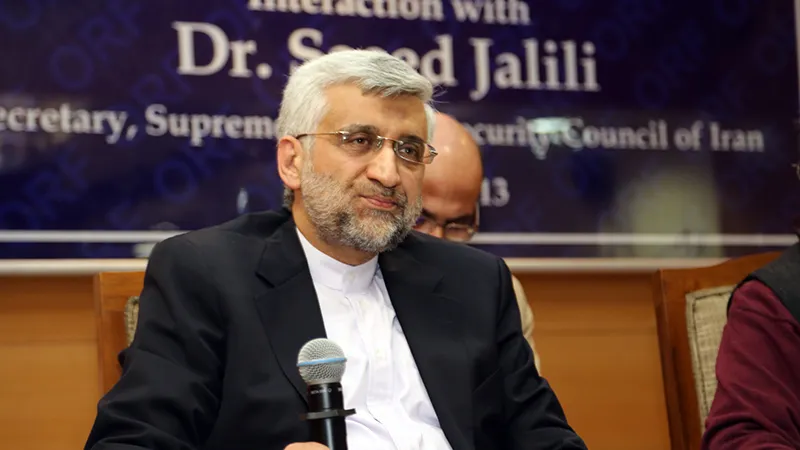-
CENTRES
Progammes & Centres
Location
The presence of US and NATO troops in Afghanistan has been counter-productive and has only led to increase in terrorism, according to Dr. Saeed Jalili, Secretary of the Supreme National Security Council of Iran.

Though the US and NATO forces have been in Afghanistan for over 10 years, claiming to be combating terrorism, their presence, in fact, has only increased the threat of terrorism, according to Dr. Saeed Jalili, Secretary of the Supreme National Security Council of Iran.
Participating in an interaction at Observer Research Foundation in New Delhi on January 2, 2013, , Dr. Jalili said the presence of western forces have also led to an increase in the narcotics trade operating out of Afghanistan, which has inadvertently led to the empowerment of the terrorist organisations.
So, Dr. Jalili suggested that America must consign itself to the failure of its so called ’War on Terror’.
He said Iran believes that the continued operation of radical groups within Afghanistan dictates that the Western Occupation of Afghanistan is not directed at merely combating armed insurgents but is primarily a strategic invasion led by economic interests.
Dr. Jalili was in India as part of his annual meeting with the National Security Advisor, Mr. Shivshankar Menon.
During the interaction at ORF, Dr. Jalili spoke in detail on several issues, including Iran’s relationship with India and the United States as well as the impact of economic sanctions.
Answering questions on the Taliban and Afghanistan, Dr. Jalili talked about the ambiguous nature of Islamic fundamentalism, and how it is frequently utilised to feed the strategic and economic interests of foreign powers, alleging that some of its manifestations are not engineered indigenously. He said the situation in Afghanistan is characteristic of this lack of clarity, especially when the considering US support for radical Islamist groups to fight an invasion from the Soviet Union.
He said Iran wants to deepen economic engagement with India, despite being under immense duress from the international community over their alleged nuclear programme. As Iran is part of India’s extended neighbourhood, its cooperation with India on regional, bilateral and global issues is imperative for both peace and prosperity for the future.
He said our common interests include trade, investment and peace, whereas common threats to security include terrorism. The two countries are also faced with foreign economic pressures. Dr. Jalili commended India for its pioneering role in the Non-Aligned Movement, which has remained a beacon for neutrality and economic independence in a multi-polar world. Initial questions addressed issues such as Iran’s perspective on the role played by the Taliban in the post-US Afghanistan, the North-South Transport Corridor, and Iran’s nuclear programme.
Dr. Jalili noted that the North South Transport Corridor is perhaps one of the most strategic projects for Iran’s relations with India and other regional powers. It is viewed as a major infrastructural development project, which can facilitate trade with the Central Asian nations, reduce transportation costs, and most importantly open up new markets for Indian goods across Eurasia.
Concerning Iran’s nuclear programme, Dr. Jalili said that it is the right of every member nation of the IAEA to pursue a peaceful nuclear programme, and that selective viewpoints towards this matter create unnecessary confusion. He mentioned that Iran is open to negotiating with the P5+1, a group composed of Germany and the five permanent members of the UN Security Council, having made a new proposal and waiting on a response from the group. He stressed that Iran is not interested in nuclear weapons, but asserted that there must be equality with which member nations of the IAEA can utilise nuclear energy for civilian purposes.
In response to questions regarding Iran’s supposed meddling in the internal affairs of the Gulf Cooperation Council (GCC), Dr. Jalili asserted that Iranian foreign policy principles are crystal clear and defendable against external scrutiny. It is a nation that respects territorial integrity and sovereignty of other nations. With the escalation of the internal conflict in both Bahrain and Syria, Iran has proposed a six-point programme centred on its commitment to democracy and the values associated with it as a political system.
In order to reach at a peaceful solution, the initiative demands that the violence and bloodshed be halted. Following this, there must be a resumption of talks and negotiations, which must contain representatives from a multitude of parties. The next step is to ensure that free and transparent elections must take place. The initiative declares foreign military intervention to be unwarranted; however, humanitarian aid must be extended to all people affected by the violence. Finally, whatever decision the people take democratically must be enacted and respected by the international community. He stated that this proposal has been discussed with important dignitaries such as Lakdhar Brahimi, Ban Ki Moon and Kofi Annan, who have expressed their support.
It was also questioned during the interaction whether the hostile relationship Iran shares with the United States goes beyond ideological constructs. Dr. Jalili said that the US has often shown certain double standards in their foreign policy principles. The US has declared democracy and free market economics to be their prime principles, yet these are at times subordinated to their economic and strategic interests. According to Dr. Jalili, this can be witnessed by US support for non-democratic regimes across the world, even in Iran where it engineered a coup d’état in 1953 to remove a democratically elected government by a monarchy, due to the brief nationalisation of Iran’s oil companies.
Dr. Jalili also believes that the recent economic sanctions imposed on Iran for its nuclear programme are incompatible with the US’s so-called commitment to free market economics.
(This report is prepared by Kartikeya Khanna, Research Intern, Observer Research Foundation)
The views expressed above belong to the author(s). ORF research and analyses now available on Telegram! Click here to access our curated content — blogs, longforms and interviews.